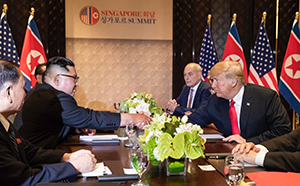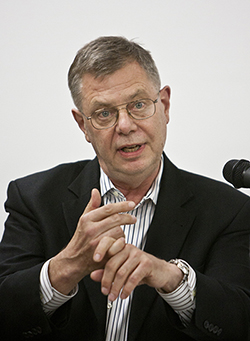“This photograph behind me is something we never thought we’d see,” said Graeme Auton, University of Redlands political science professor and international security expert, displaying a photo of President Donald Trump and North Korean leader Kim Jong-un shaking hands during their June 12 summit in Singapore.

Auton, who was speaking on “Korea 2.0” as part of the Redlands Forum series, noted the two leaders met to discuss the complete denuclearization of the Korean peninsula. In addition to denuclearization, Trump was pushing for the retrieval of remains of U.S. soldiers who were declared missing in action during the Korean War.
Especially in light of the historically rocky relations between North Korea and South Korea, Auton cautioned that any development of an arms control agreement will be a long and arduous undertaking. “The public needs to understand that this is not a simple, straightforward process,” he said.
According to Auton, in order for an arms control agreement to be effective, it must be:
- Militarily significant: “If it isn’t significant, why do it?” he asked.
- Supportive of political and military stability.
- Legally binding.
- Verifiable: “Each side has to be able to make sure that its counterpart is living up to their end of the bargain,” he said.
- Negotiable: “The agreement has to be based on the reasonable convergence of the interests of both sides,” Auton said.
In addition, Trump and Jong-un must agree on the exchange of various data, objectives, timetables, compliance, inspections, protocol, and consequences for noncompliance.

Due to these requirements, Auton predicted that any agreement will take more than two years and has only a 25 percent chance of completion. “Of course, Trump wants this presented to him as a package deal by 2020, because he may not be around after that,” he said. An arms control agreement could be stalled by factors including: effects on U.S. relationships with allied countries; Chinese sanctions; or North Korea’s horrendous human rights record.
In closing, Auton recognized how past U.S. presidents dealt with diplomatic relations with North Korea—some came close to agreements, while others completely disregarded the relationship. “Trump took an unprecedented step forward and actually met with Kim Jong-un,” Auton said. “North Korea is a bipartisan problem, and an American issue that goes back 30 years.”
Next up in the Redlands Forum, which is co-hosted by Esri and University of Redlands Town and Gown, is “Finishing a New History of Redlands: Dealing with the Living and the Dead,” by Larry Burgess, historian and director emeritus of A. K. Smiley Public Library. Registration, which opens one week prior to the talk, is required. For more information, see the Redlands Forum website.






